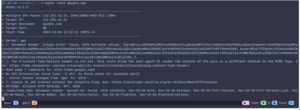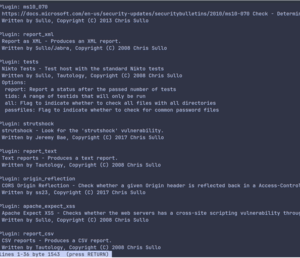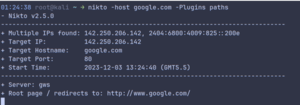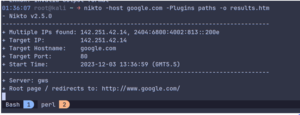
With its ability to facilitate both manual and automated testing, this tool offers security professionals a flexible solution to assess the security stance of web servers. Nikto possesses an extensive repository of recognized vulnerabilities, which enables it to identify a wide array of concerns such as obsolete server software, exposed sensitive files, and potential security hazards.

In addition, Nikto possesses the capability to produce comprehensive reports and seamlessly integrate with additional security tools, rendering it an invaluable resource for ethical hackers and security analysts who aim to strengthen the security of online systems and web server defenses. Active community support, regular updates, and user-friendliness all contribute to its prominence in the cybersecurity community.
#Nikto Flags
| -help | This help information |
| -host+ | Target host/URL |
| -id+ | Host authentication to use, format is id:pass or id:pass:realm |
| -ipv4 | IPv4 Only |
| -ipv6 | IPv6 Only |
| -list-plugins | List all available plugins, perform no |
| -mutate+ | Guess additional file names: |
| -mutate-options | Provide information for mutates |
| -nointeractive | Disables interactive features |
| -nolookup | Disables DNS lookups |
| -nossl | Disables the use of SSL |
| -noslash | Strip trailing slash from URL (e.g., ‘/admin/’ to ‘/admin’) |
| -no404 | Disables nikto attempting to guess a 404 page |
| -output+ | Write output to this file (‘.’ for auto-name) |
| -Plugins+ | List of plugins to run (default: ALL) |
| -port+ | Port to use (default 80) |
| -RSAcert+ | Client certificate file |
| -root+ | Prepend root value to all requests, format is /directory |
| -Save | Save positive responses to this directory (‘.’ for auto-name) |
| -ssl | Force ssl mode on port |
These are some important flags that you use when you are trying to gather information on the host. Below is a simple example of the Nikto:

You can check out all the plugins with `-list-plugins`.

For demonstration, I can use the ‘path’ plugin on google.com. By default nikto runs all the plugins.

I can save my output using ‘-o filename’. Be sure to end your filename with any of these extensions:
| csv | Comma-separated-value |
| json | JSON Format |
| htm | HTML Format |
| nbe | Nessus NBE format |
| sql | Generic SQL (see docs for schema) |
| txt | Plain text |
| xml | XML Format |

Comments
Post a Comment